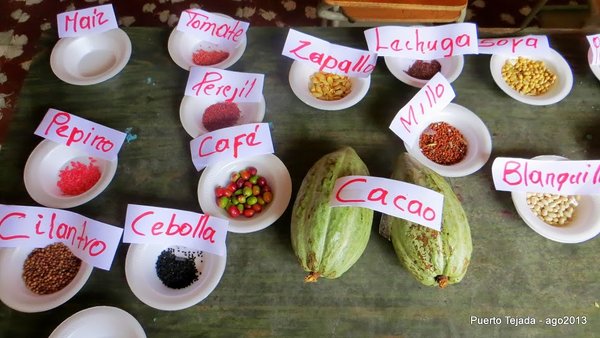- Share this article
- Subscribe to our newsletter
The Right to Food and EU seed marketing legislation
The European Union Treaty (Article 208) affirms the principle of Policy Coherence for Development (PCD), which requires the EU to consider development objectives in its policy-making and fight against hunger and malnutrition.
On the 20th anniversary of the Voluntary Guidelines on the Right to Food, the emphasis is on the direct interlinkages with peasants’ and farmers’ rights to seeds, as stipulated in the International Treaty on Plant Genetic Resources for Agriculture (ITPGRFA) and the UN Declaration on the Rights of Peasants and Other People Working in Rural Areas (UNDROP). The extent to which the EU’s seed marketing regulations respect and support farmers’ and peasants’ rights to seeds, or to which they may harm or advance the EU’s international obligations to preserve and ensure the sustainable use of biodiversity, is of concern regarding development policy.
Brot für die Welt (BfdW) and Swiss Church Aid (HEKS/EPER) support AFSA, the Alliance for Food Sovereignty in Africa, in its struggle for peasants’ rights to seeds, which is paramount to robust seed and agricultural systems and farmers’ sovereign choice. Farmers using agroecological approaches and open pollinated seeds are more resilient and better equipped to cope with crises, as was demonstrated during the Covid pandemic.
According to the authors, an EU-funded study by DeSIRA on seed laws harmonisation in Africa in 2022 affirms the EU’s human rights approach in support of farmers’ rights to save, reuse, and exchange or sell farm-saved seed, and acknowledges the influence of the EU on seed laws in Africa through economic and trading relations.
BfdW and HEKS share the opinion that EU seed marketing legislation should diversify the seed market offer to respond to the needs of all farmers; especially those growing in organic and agroecological conditions often not catered to by the commercial seed industry and its uniform varieties focusing on productivity instead of adaptability, resistance and resilience. Legislation should recognise and incentivise the contribution of farmers and community seed banks to the conservation of agrobiodiversity, as well as its sustainable use.
Catering to the needs of all farmers and their diverse seed systems and recognising their contribution to the conservation of agrobiodiversity should be at the heart of the reform of the EU’s seed marketing legislation.
The European Commission’s Regulation proposal for the marketing of plant reproductive material was published on the 5th July 2023, together with theproposal on the New Genomic Techniques. While the latter will hamper farmers’ rights, especially the right to control their seeds, the seed marketing proposal provided some starting points to carve out proportionate rules for the different seed systems that exist in Europe, despite important shortcomings. On the 19th March 2024, the Agricultural Committee of the European Parliament voted on the seed file in favour of increasing seed diversity and affirming farmers’ rights to sell and exchange their own seeds under specific conditions or within (some) limitations.
The EP plenary vote in April ought to affirm the realisation of farmers’ rights and seed diversity, which is crucial for the future of food and farming in the EU and beyond.
Indeed, the draft EP AGRI Committee’s report coordinated by MEP Herbert Dorfmann will need to be defended by the EP plenary vote expected on the 23rd or 24th April to
- exempt activities aimed at the dynamic conservation of agrobiodiversity as well as on farm research from the scope of the seed marketing legislation,
- adopt tailored and proportionate rules for conservation networks and the exchange and sale of seeds by farmers in limited quantities, and
- adapt the specific market access regimes of conservation varieties and heterogeneous material to ensure the diversification of the seed market, which is direly needed to support agroecological production.
These positive steps have been received critically by the seed industry and industrial farmers, who claim that they will lead to sanitary problems and create parallel markets of low seed quality. However, the EU plant health regulation 2016\2031 applies to all exchanges of seeds, whether these are marketed or not. These stringent rules triggered by the mere “movement” of seeds include comprehensive traceability requirements. As a result, exemptions in seed marketing legislation will not severely undermine seed health.
Users should have the right to an informed choice about the seeds they are purchasing or receiving. The seed law should provide for a transparent regime for the marketing of locally adapted conservation varieties (both old and new) and heterogeneous material that have proven to be better equipped to adapt to lower-input agroecological production, especially in marginal areas and territorial markets. Providing distinct rules to different market actors in respect of the principles of subsidiarity and proportionality in the Single Market will make the EU fit for inclusive growth.
In line with the EU’s obligations under the ITPGRFA and the Convention on Biological Diversity (CBD), seed savers, farmers, conservation networks and community seed banks should not have to comply with seed laws made for seed industry. By establishing clear rules and limits for conservation activities, the EP draft report provides legal certainty to numerous seed savers and farmers who engage in seed production and transfers for the purpose of conservation.
We therefore call on the European Parliament to counter industry attempts to minimise derogations for market access and degrade articles on agrobiodiversity conservation, including farmers’ seed exchange.
We further call on all EU institutions engaged in the process to ensure the full participation of peasants and farmers in decision-making on seed policy, beyond mere consultation or matters related to variety denomination or registration.
PCD matters to EU seed marketing legislation and to seed markets for agroecology, because implementing Farmers’ Rights in EU law will strengthen the right to food and its voluntary guidelines.
Authors: Tina Goethe (HEKS, Switzerland), Stig Tanzmann (Brot für die Welt, Germany)
More information:
Link to Alliance for Food Sovereignty in Africa





Add a comment
Be the First to Comment